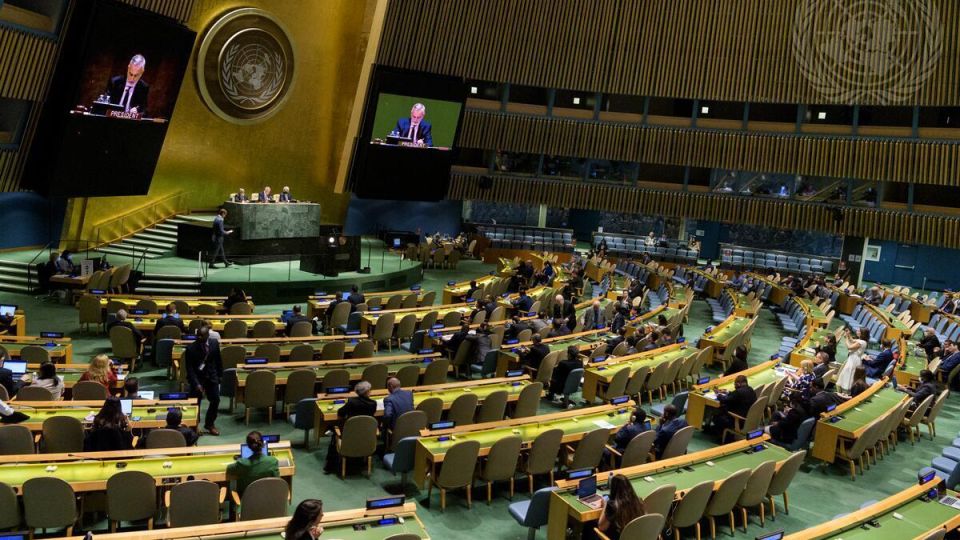August 25, 2022
SEOUL – Member states of the Treaty on the Nonproliferation of Nuclear Weapons, or NPT, are seeking to adopt a final declaration that urges North Korea to promptly take “concrete measures” to abandon its missile and nuclear programs and denies its self-claimed status as a nuclear weapon state.
The draft of a final statement on the 10th NPT review conference, which kicked off Aug. 1 and continues until Friday in New York, was released this week in the run-up to the closing.
North Korea’s nuclear buildup was raised as one of the key regional issues in the 34-page declaration, which should be adopted by unanimous consent of the 191 NPT member states as a consensus substantive outcome of the conference. The NPT has near-universal membership, with only India, Israel, North Korea, South Sudan and Pakistan remaining outside the treaty.
“The conference further calls on the DPRK to take concrete measures as soon as possible to abandon all its nuclear weapons, ballistic missiles and related programs in a complete, verifiable and irreversible manner,” the English-language draft released Monday read, referring to the official name of North Korea.
N. Korea should return to NPT
The conference “expresses its unwavering support for the complete denuclearization of the Korean Peninsula,” urging North Korea to abide by its international obligations and related UN Security Council resolutions.
In the final statement, the NPT member states underscored that North Korea “must not conduct any further nuclear tests” and called for North Korea to rejoin the NPT regime. Pyongyang withdrew from the NPT in 2003 after having joined the treaty in 1985, and is still the only such case of its kind.
“Recalling that the DPRK cannot have the status of a nuclear-weapon state pursuant to the NPT, the Conference calls on it to return without delay to the NPT and to the application of IAEA safeguards on all of its nuclear activities,” the draft said.
North Korean leader Kim Jong-un has openly labeled his country as a nuclear weapon state in key speeches. But the NPT regime recognizes five nuclear weapon-possessing countries: China, France, Russia, the United Kingdom and the United States.
The NPT members also encourage concerned countries to resolve the North Korean nuclear issue through negotiations and diplomacy.
“In this regard, the Conference stresses that all parties concerned should exercise restraint, refrain from escalatory steps, adhere to the general direction of political settlement and resolve their respective concerns through meaningful dialogue in order to promote peace and the denuclearization of the Korean Peninsula.”
This year’s NPT review conference comes amid the protracted war between Russia and Ukraine. In the draft, the NPT members notably “recognize that the risk of nuclear weapons being used is now higher than at any time since the end of the Cold War.”
The adoption of the final statement is a key indicator that defines the success of a review conference that is held every five years to assess the operation of the treaty.
But questions remain on whether the final declaration will be adopted unanimously at the long-awaited 10th review conference, being held for the first time in seven years following delays due to the COVID-19 pandemic.
The final statement particularly states “grave concern for the military activities” by Russian forces near or at the Zaporizhzhya nuclear power plant and other facilities and locations within Ukraine and the loss of control by Ukrainian authorities.
The 2015 Review Conference failed to reach an agreement on a final declaration mainly due to divergence of opinion in the establishment of a zone free of nuclear and other weapons of mass destruction and their delivery systems in the Middle East.
But in 2010, the NPT members concurred on the final statement that urged North Korea to fulfill its commitments under the Six-Party Talks, including the complete and verifiable abandonment of all nuclear weapons and existing nuclear programs.
Scenario of N. Korea using nukes
Meanwhile, the South Korean government on Wednesday conducted an interagency tabletop exercise to enhance capabilities to deter and respond to threats posed by North Korea’s nuclear weapons and weapons of mass destruction, or WMD, the Defense Ministry said on the day.
South Korea’s Defense Minister Lee Jong-sup led the tabletop exercise, which was staged as part of the government’s Ulchi civil defense drills. The drills are scheduled to be held from Monday to Thursday in parallel with the Ulchi Freedom Shield exercise between South Korea and the US.
Chairman of the Joint Chiefs of Staff Kim Seung-kyum, key military staff as well as officials from eight government agencies, including the Foreign Ministry and Ministry of the Interior and Safety, also took part in the tabletop exercise.
The military and ministries reviewed various countermeasures that each had prepared in case signs of North Korea using nuclear weapons were detected, and discussed how to cooperate substantially in such a contingency scenario.
The tabletop exercise aimed to “integrate efforts of the military and each ministry and come up with effective countermeasures based on the South Korea-US alliance,” according to the Defense Ministry.
The ministry said that the tabletop exercise was conducted at a juncture when the “threats of North Korea using nuclear weapons and WMD are growing.”
Lee also underlined that the “security situation is graver than it has ever been due to North Korea’s preparation for launching various types of missiles and conducting a seventh nuclear test.”


